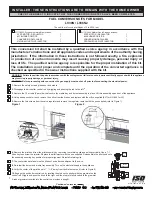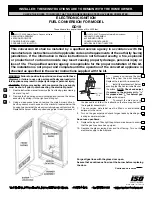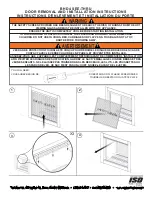
Page 6
16717-2-0605
Model
VFHS-20R
VFHS-20/10T
Input Maximum
20,000
20,000/10,000
Minimum
14,000
7,000/7,000
Minimum Firebox Opening
Height
26 3/4"
26 3/4"
Depth
11 1/4"
11 1/4"
Front Width
23 1/4"
23 1/4"
Rear Width
17 1/4"
17 1/4"
Gas Inlet
3/8"
3/8"
SPECIFICATIONS
Accessories
VFS-BK
Automatic Blower
EHL-24-1
Brick Liner
VPP1A-22
Aged Brick Liner
Accessories For VFHS-20R Only
FRBC-1
Battery Operated Remote Control
FRBTC-1
Battery Operated Remote Control
w/Thermostat
FREC-1
Electric Remote Control
FWS-1
Wall Switch
GWSG-T
Wall Thermostat, Millivolt
TMV
Wall Thermostat, Millivolt - Reed Switch
TRW
Wireless Remote Wall Thermostat
Water vapor is a by-product of gas combustion. An unvented room
heater produces approximately
one (1) ounce (30ml) of water for
every 1,000 BTU's (.3KW's) of gas input per hour. .
Unvented room heaters are recommended as supplemental heat (a
room) rather than a primary heat source (an entire house). In most
supplemental heat applications, the water vapor does not create a
problem. In most applications, the water vapor enhances the low
humidity atmosphere experienced during cold weather.
The following steps will help insure that water vapor does not
become a problem.
1. Be sure the heater is sized properly for the application, including
ample combustion air and circulation air.
2. If high humidity is experienced, a dehumidifier may be used
to help lower the water vapor content of the air.
3. Do not use an unvented room heater as the primary heat
source.
This heater shall not be installed in a confined space or unusually
tight construction unless provisions are provided for adequate
combustion and ventilation air.
The National Fuel Gas Code defines a confined space as a space
whose volume is less than 50 cubic feet per 1,000 Btu per hour
(4.8m
3
per kw) of the aggregate input rating of all appliances
installed in that space and an unconfined space as a space whose
volume is not less than 50 cubic feet per 1,000 Btu per hour (4.8
m
3
per kw) of the aggregate input rating of all appliances installed
in that space. Rooms communicating directly with the space in
which the appliances are installed, through openings not furnished
with doors, are considered a part of the unconfined space.
Unusually Tight Construction
The air that leaks around doors and windows may provide enough
fresh air for combustion and ventilation. However, in buildings
of unusually tight construction, you must provide additional fresh
air.
Unusually tight construction is defined as construction
where:
a. Walls and ceilings exposed to the outside atmosphere have
a continuous water vapor retarder with a rating of one perm
or less with openings gasketed or sealed, and
b. Weatherstripping has been added on openable windows and
doors, and
c. Caulking or sealants are applied to areas such as joints
around window and door frames, between sole plates and
floors, between wall-ceiling joints, between wall panels,
at penetrations for plumbing, electrical, and gas lines, and
at other openings.
If your home meets all of the three criteria above, you must
provide additional fresh air. See “
Ventilation Air From
Outdoors
,” page 7.
Determining if You Have a Confined or Unconfined Space
Use this worksheet to determine if you have a confined or unconfined
space.
Space:
Includes the room in which you will install heater plus
any adjoining rooms with doorless passageways or ventilation
grills between the rooms.
1. Determine the volume of the space (length x width x height).
Length x Width x Height =
cu. ft. (volume
of space)
Example:
Space size 16 ft. (length) x 10 ft. (width) x 8 ft. (ceiling
height) = 1,280 cu. ft. (volume of space)
If additional ventilation to adjoining room is supplied with
grills or openings, add the volume of these rooms to the total
volume of the space.
2. Divide the space volume by 50 cubic feet to determine the
maximum BTU/Hr the space can support.
(volume of space) ÷ 50 cu. ft. = (maximum
BTU/Hr the space can support)
Example:
1,280 cu. ft. (volume of space) ÷ 50 cu. ft. = 25.6
or 25,600 (maximum BTU/Hr the space can
support)
WATER VAPOR: A BY-PRODUCT OF UNVENTED ROOM HEATERS
PROVISIONS FOR ADEQUATE COMBUSTION & VENTILATION AIR







































